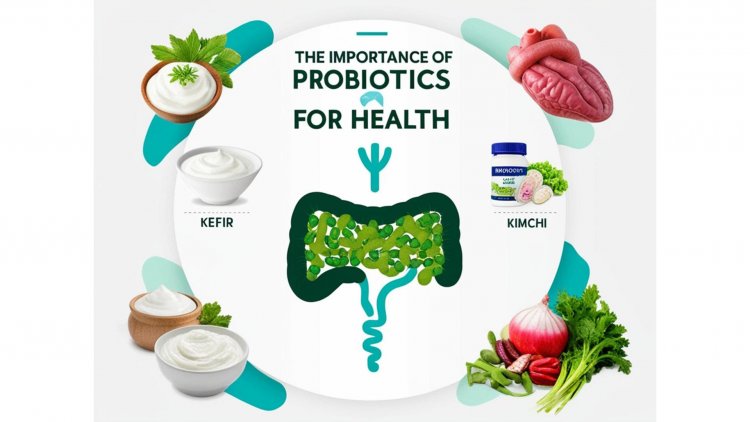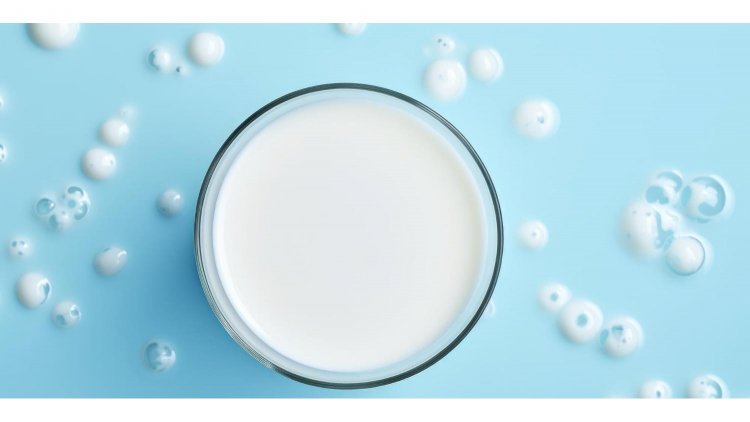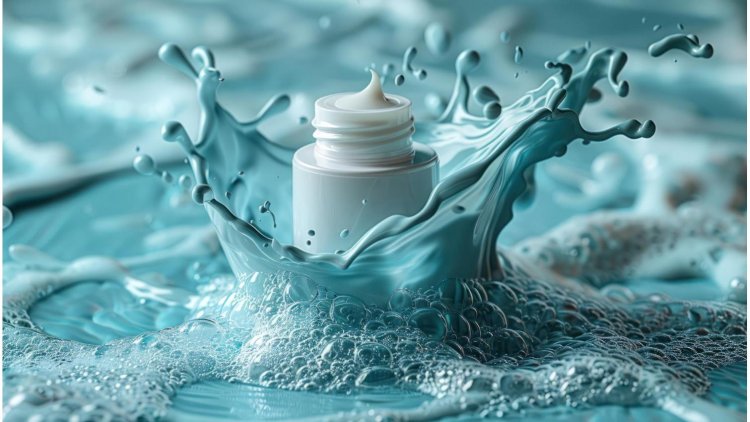Unveiling the Secret: How Probiotics Are Revolutionizing Skincare
In recent years, probiotics have gained significant popularity in the realm of skincare, transitioning from their traditional role in digestive health to becoming a key player in maintaining and enhancing skin vitality. This shift is not merely a passing trend; it's a testament to the growing recognition of the profound impact that gut health has on overall well-being, including skin health. Probiotics, commonly known for their beneficial effects on the gut microbiome, are now being hailed as a revolutionary ingredient in skincare products. But what exactly are probiotics, and how are they transforming the skincare landscape?


The Role of Probiotics in Skin Health
Probiotics are live microorganisms that, when administered in adequate amounts, confer a health benefit to the host. Traditionally, they have been associated with gut health, where they help maintain a balanced microbiome, support digestion, and bolster the immune system. However, emerging research indicates that the benefits of probiotics extend far beyond the gut. The concept of the "skin microbiome" parallels that of the gut microbiome, suggesting that maintaining a healthy balance of microorganisms on the skin is crucial for optimal skin health.
Probiotics and the Skin Microbiome
The skin microbiome is a diverse community of microorganisms residing on the skin's surface. These microorganisms, which include bacteria, fungi, and viruses, play a vital role in protecting the skin from harmful pathogens, regulating inflammation, and maintaining skin barrier function. A balanced skin microbiome is essential for healthy, resilient skin.
Probiotics contribute to skin health by promoting the balance of the skin microbiome. They help suppress the growth of pathogenic microorganisms while enhancing the growth of beneficial ones. This balance can lead to improved skin texture, reduced inflammation, and enhanced overall skin health.
How Probiotics Influence Skin Conditions
The impact of probiotics on various skin conditions is a burgeoning area of research. Here are some notable ways in which probiotics have been shown to benefit specific skin issues:
Acne
Acne is a common skin condition characterized by clogged pores, inflammation, and overgrowth of acne-causing bacteria. Probiotics may help manage acne by modulating the skin's inflammatory response and restoring the balance of microorganisms on the skin. Research has shown that certain probiotic strains can reduce the severity of acne lesions and improve skin clarity.
Eczema
Eczema, or atopic dermatitis, is a chronic inflammatory skin condition that causes itching, redness, and dryness. Probiotics have been shown to have anti-inflammatory effects, which can be beneficial for individuals with eczema. By enhancing the skin barrier function and modulating the immune response, probiotics may help alleviate eczema symptoms and reduce flare-ups.
Rosacea
Rosacea is a chronic skin condition characterized by redness, visible blood vessels, and sometimes acne-like breakouts. Probiotics may help manage rosacea by reducing inflammation and supporting the skin's natural barrier function. Some studies suggest that probiotics can improve skin hydration and reduce redness associated with rosacea.
The Science Behind Probiotics in Skincare
The efficacy of probiotics in skincare is grounded in scientific research. Several mechanisms explain how probiotics positively impact skin health:
Modulation of Inflammation
Chronic inflammation is a common underlying factor in many skin conditions. Probiotics can help modulate the immune system and reduce inflammation by influencing the production of inflammatory cytokines. This anti-inflammatory effect can be beneficial for conditions like acne, eczema, and rosacea.
Strengthening the Skin Barrier
The skin barrier is the outermost layer of the skin, crucial for protecting against environmental aggressors and retaining moisture. Probiotics can enhance the skin barrier function by promoting the production of ceramides and other essential lipids. A stronger skin barrier helps prevent moisture loss and reduces susceptibility to irritants and pathogens.

Enhancing Skin Hydration
Probiotics can improve skin hydration by influencing the skin's moisture levels. Some probiotic strains produce substances that help retain moisture and support the skin's natural hydration processes. This can lead to plumper, more hydrated skin and reduce the appearance of dryness and flakiness.
Incorporating Probiotics into Your Skincare Routine
With the growing popularity of probiotics in skincare, many products now feature these beneficial microorganisms. However, incorporating probiotics into your skincare routine requires careful consideration to ensure you are using products that deliver real benefits.

Types of Probiotic Skincare Products
Probiotic skincare products come in various forms, including:
- Cleansers: Probiotic-infused cleansers help remove impurities while supporting the skin's microbiome balance.
- Serums: Probiotic serums deliver concentrated doses of beneficial microorganisms and other active ingredients to target specific skin concerns.
- Moisturizers: Probiotic moisturizers help hydrate the skin and strengthen the skin barrier while promoting a healthy skin microbiome.
- Masks: Probiotic masks provide a deep treatment that can enhance the skin's overall health and appearance.
Choosing the Right Probiotic Skincare Products
When selecting probiotic skincare products, consider the following factors:
- Strain Specificity: Different probiotic strains offer different benefits. Look for products that specify the strain used and its intended effect on the skin.
- Formulation: Check the formulation for other beneficial ingredients that complement the probiotics, such as prebiotics, antioxidants, or hydrating agents.
- Product Integrity: Ensure the product is stored properly to maintain the viability of the probiotics. Some products may require refrigeration or have specific expiration dates.
DIY Probiotic Skincare Solutions
For those interested in a more personalized approach, DIY probiotic skincare solutions are also an option. These can include homemade masks, exfoliants, and treatments using probiotic-rich ingredients like yogurt or fermented extracts. However, it's important to ensure that DIY solutions are prepared under hygienic conditions and that they contain live probiotic cultures to be effective.
The Future of Probiotics in Skincare
The future of probiotics in skincare looks promising, with ongoing research uncovering new potential benefits and applications. As our understanding of the skin microbiome continues to evolve, we can expect to see more innovative products and formulations that leverage the power of probiotics. Additionally, advancements in biotechnology may lead to the development of more targeted probiotic treatments tailored to individual skin needs.
In summary, probiotics represent a groundbreaking advancement in skincare, offering a natural and effective way to enhance skin health and address various skin concerns. By supporting the balance of the skin microbiome, reducing inflammation, and strengthening the skin barrier, probiotics have the potential to transform skincare routines and improve overall skin vitality. As with any skincare trend, it's important to approach probiotic products with informed choices and an understanding of their benefits and limitations.
Unlocking the Full Potential of Probiotics in Skincare: What Lies Ahead
As the field of probiotic skincare continues to expand, the possibilities for enhancing skin health are becoming increasingly exciting. From pioneering research to emerging products, the future promises innovative approaches to integrating probiotics into skincare regimens. Here’s a look at what to expect in the evolving world of probiotic skincare.
Advances in Probiotic Research
The ongoing research into probiotics and their impact on skin health is uncovering new ways these microorganisms can benefit the skin. Future studies may provide deeper insights into:
- Customizable Probiotics: Personalized skincare solutions using specific probiotic strains tailored to individual skin types and conditions could become more prevalent. Genetic and microbiome profiling may allow for customized probiotic treatments designed to address unique skin needs.
- Probiotic Delivery Systems: Advances in biotechnology are likely to lead to more effective delivery systems for probiotics. Innovations such as nano-encapsulation and targeted delivery methods could enhance the stability and efficacy of probiotics in skincare products.
- Synergistic Ingredients: Combining probiotics with other active ingredients, such as peptides, antioxidants, and vitamins, may amplify their benefits. Research into these synergistic effects will likely yield more sophisticated and effective formulations.
The Role of Prebiotics in Enhancing Probiotic Skincare
Prebiotics are compounds that feed beneficial microorganisms, including probiotics, and help them thrive. Incorporating prebiotics into skincare products can enhance the efficacy of probiotics by ensuring they have the nutrients they need to flourish. Some common prebiotic ingredients include:
- Inulin: A naturally occurring prebiotic fiber found in many plants, which helps support the growth of beneficial bacteria.
- Chicory Root Extract: Rich in inulin, this extract helps maintain a healthy skin microbiome.
- Beta-Glucans: These polysaccharides support the immune system and promote the growth of beneficial microorganisms.
Sustainable and Ethical Probiotic Skincare
As consumer awareness grows regarding sustainability and ethical practices, probiotic skincare brands are increasingly focusing on these aspects:
- Eco-Friendly Packaging: Many brands are adopting sustainable packaging solutions to reduce environmental impact. This includes using recyclable materials and minimizing plastic waste.
- Ethical Sourcing: Ensuring that probiotic strains are sourced responsibly and that products are free from harmful chemicals and animal testing is becoming a priority.
- Transparency: Consumers are demanding transparency in ingredient sourcing and product formulations. Brands that provide clear information about their probiotic strains and production processes are likely to gain consumer trust.
The Intersection of Probiotics and Holistic Skincare
Holistic skincare takes into account the overall well-being of the body and mind, and probiotics fit seamlessly into this approach. Integrating probiotics into a holistic skincare regimen involves:
- Diet and Lifestyle: A balanced diet rich in prebiotic and probiotic foods, such as yogurt, kefir, and fermented vegetables, can complement topical probiotic treatments. Stress management and adequate sleep also contribute to healthy skin.
- Mind-Body Connection: Practices such as mindfulness, meditation, and yoga can reduce stress and promote a healthy skin barrier. Incorporating probiotics into a holistic routine supports both internal and external factors affecting skin health.
Consumer Education and Awareness
As probiotic skincare becomes more mainstream, educating consumers about the benefits and limitations of these products is crucial. Brands and skincare professionals should focus on:
- Clear Communication: Providing straightforward information about how probiotics work, their benefits, and how to use them effectively helps consumers make informed choices.
- Evidence-Based Claims: Ensuring that product claims are backed by scientific research and clinical studies builds credibility and trust.
Embracing Probiotic Skincare: The Path Forward
Incorporating probiotics into skincare routines offers a promising avenue for enhancing skin health and addressing various skin concerns. With ongoing research and advancements in technology, the potential benefits of probiotics are likely to expand, leading to more personalized and effective skincare solutions. As consumers become more informed and brands innovate, the future of probiotic skincare looks bright, ushering in a new era of natural, science-backed beauty.
In conclusion, probiotics represent a significant leap forward in the realm of skincare, merging the science of microbiology with the art of skincare. By promoting a balanced skin microbiome, reducing inflammation, and enhancing skin hydration, probiotics offer a multifaceted approach to achieving healthy, radiant skin. As the field continues to evolve, staying informed about the latest research and product innovations will empower individuals to make the most of this transformative ingredient.
Disclaimer: The information provided in this article is for educational purposes only and should not be considered medical advice. If you have any health concerns or are experiencing symptoms, it is important to consult with a healthcare professional, such as a doctor or clinic, for proper diagnosis and treatment. Always seek the advice of your doctor or other qualified health provider with any questions you may have regarding a medical condition. Do not disregard professional medical advice or delay in seeking it because of something you have read in this article.
What's Your Reaction?





















